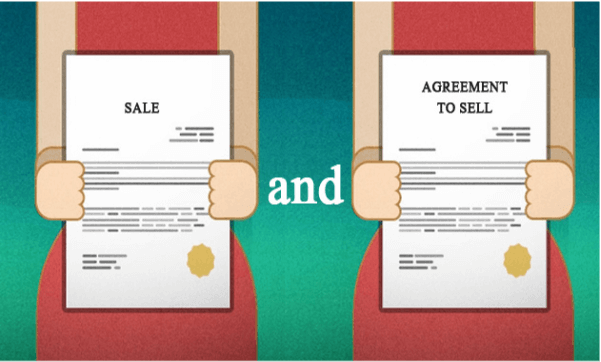Difference between Sale and Agreement to SellBoth "sale" and "agreement to sell" are considered part of a contract, but from a legal perspective, both terms have slight differences. A "Sale" is a particular kind of contract wherein one party (the seller) either transfers ownership of things to the other party (buyer) or agrees to do so in exchange for money. In a contract of sale, "agreement to sell" refers to the intention to sell the products at a predetermined date or upon fulfilling specified criteria. A sale and an agreement to sell can both be included in the contract of sale. Sale is the exchange of ownership of goods/ services for a predefined sum of money from a sales agent to the buyer, whereas the transfer of ownership under an agreement to sell occurs when certain requirements are met later. The agreement to sell can be compared to a transaction with specified requirements. However, "sale" refers to the actual selling of commodities. Hence, there is a considerable difference between goodwill (trust factor) and product transfer regarding the legal point of view of both terms. Moreover, each has different risks involved as both the parties (the seller and the buyer) have different ownership rights. Let us now understand each in detail: What is a Sale?A sale is regarded as an already completed contract for legal purposes. Two or more parties sign an executed contract. When each party has fulfilled their commitments, i.e., followed the rules of the contract, the agreement is deemed fully executed. The ownership is automatically transferred through a simple transaction. Furthermore, a sale can only occur if the product or service is either tangible or intangible. 
Sale is the rudimentary form of any business or economic activity. A sale can be defined as the process of interchanging a product or service for digital money or cash, or other valuables, such as trade or barter. A sale is the result of a trade between a seller and a buyer in which the buyer acquires a product or service in exchange for money or other physical commodities. The concept of sales is crucial to any business, as it is the primary source of revenue that allows a business to sustain and grow over time. A sale occurs when a buyer purchases a product or service from a seller in exchange for payment. A sale can be a one-time transaction or part of a long-term relationship between the buyer and seller. For instance, a customer can buy a product from a retailer or enter into a subscription agreement with a service provider. In both cases, a sale occurs, and the buyer acquires the right to use or consume the product or service. Another essential aspect of sales is the role of the buyer and seller. The buyer is the party that acquires ownership of the product or service, while the seller is the party that provides the product or service in exchange for payment. The buyer can inspect the product or service before purchasing it. The seller has the duty of providing accurate info about the product or service's quality, features, and benefits. The seller is also in charge of delivering the product or service as promised and ensuring the buyer is satisfied with the purchase. Buyers and sellers can be individuals or entities, such as businesses or NPOs (non-profit organizations). Sales are crucial to any business or economic activity. Sales generate revenue that allows a business to sustain and grow over time. Revenue is a business's total income from selling products or services minus the costs and expenses. The revenue from sales is used to pay for the cost of goods sold, labor, marketing, and other expenses and generate profits. The profits are the excess revenue after deducting the costs and expenses, which can be reinvested in the business or distributed to shareholders. Sales also play a significant role in the economy. Sales generate demand for products and services, which creates jobs, increases production, and drives economic growth. When consumers buy products and services, businesses respond by increasing production and hiring more workers to meet the demand. As a result, sales drive the economy, creating a cycle of demand, production, and employment. Sales can also have social and cultural implications. Sales can promote the exchange of ideas, values, and traditions between different cultures and societies. For instance, when people from different cultures buy and sell products and services, they exchange ideas, beliefs, and customs. Sales can also promote social mobility by providing opportunities for people to start and grow businesses, acquire new skills, and improve their standard of living. Moreover, selling is not only limited to physical contact for the exchange of goods or services in exchange for money. In the modern digital era, sales can also occur online, where buyers purchase goods or services through e-commerce platforms. E-commerce sales occur through websites or mobile apps, where buyers can browse, select, and purchase products or services from sellers anywhere in the world. Payment for e-commerce sales can be made easily through a wide range of online payment methods, such as credit/debit cards, e-wallets, or UPI. In contrast, the products or services purchased are delivered to the given physical address or emails. External factors influence sales, such as economic conditions, consumer behavior, and technological advancements. For example, during economic downturns or recessions, sales may decline due to decreased consumer spending and purchasing power. Similarly, changes in consumer behavior, such as shifting preferences, demographics, or buying habits, can also impact sales. Technological advancements, such as the rise of e-commerce or automation, can disrupt traditional sales channels and require businesses to adapt and innovate to remain competitive. Types of SaleA sale can be further classified into two parts:
What is an Agreement to Sell?Instead of an executed contract, an 'Agreement to Sell' is an executory contract, which indicates that the seller bears the risks until the goods have been transferred to the owner or the condition written in the contract has been completely fulfilled. The sale transaction is preceded by the agreement to sell. Both the buyer and the seller consent to exchanging products that will be sold at a future date rather than right away. 
An agreement is finally referred to as a sale after the fulfillment of the conditions or after the expiry of the given time. The seller can resell the item if the buyer cannot fulfill the requirements because ownership still needs to be transferred. In contrast, after a sale has been made, the seller cannot resell. An agreement to sell can be compared to a real estate contract. The agreement to sell document is used when a buyer and seller are about to consummate a deal to purchase real estate. It specifies the circumstances under which the seller will sell the property. The buyer can provide this document to a bank to obtain a loan for the purchase and sale agreement transaction. An agreement to sell is a legally binding contract between two or more parties in which one party agrees to sell goods or services to another party at a specified price and on agreed-upon terms. These contracts are often used in business transactions, real estate deals, and other commercial arrangements. Types of Agreements to SellThere are several types of agreements to sell, depending on the nature of the transaction and the goods or services involved. For example, a real estate purchase agreement is a type of agreement to sell that outlines the conditions of a property sale. Similarly, a sales contract is an agreement to sell that sets out the terms of a purchase or sale of goods. Other selling agreements include lease agreements, employment contracts, and service agreements. Importance of a Written Agreement to SellA written agreement to sell is essential for several reasons. First, it provides clarity and certainty about the terms of the transaction, which can prevent misunderstandings and disputes between the parties. Second, it serves as evidence of the party's intentions and can be used to enforce their legal rights if necessary. Finally, a written agreement to sell can protect both parties from potential fraud or misrepresentation by providing transaction-recorded terms. Common Terms in an Agreement to SellAn agreement to sell typically contains several common terms that define the rights and obligations of the parties. These terms may include the purchase price, payment terms, delivery date, warranties, and remedies for breach of contract. Other terms may include provisions for dispute resolution, confidentiality, and agreement termination. Difference between a Sale and an Agreement to SellSales and agreements to sell are two fundamental concepts in commerce, often used interchangeably. However, they have different meanings and implications in the legal context. Understanding the distinction between these concepts is crucial for businesses and individuals buying and selling goods. 
ConclusionIn conclusion, while sales and agreements to sell are similar concepts, they have distinct legal meanings and implications. A sale is a complete transfer of ownership, while an agreement to sell is a promise to transfer ownership at a future date or upon the occurrence of a specific event. In a sale, ownership, and risk are immediately submitted and cleared off to the buyer, while in an agreement to sell, ownership and risk remain with the seller until delivery. Understanding the differences between these two concepts is essential for businesses and individuals involved in buying and selling goods, as it can have significant legal and financial consequences.
Next TopicDifference between
|
 For Videos Join Our Youtube Channel: Join Now
For Videos Join Our Youtube Channel: Join Now
Feedback
- Send your Feedback to [email protected]
Help Others, Please Share









